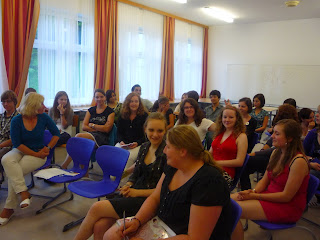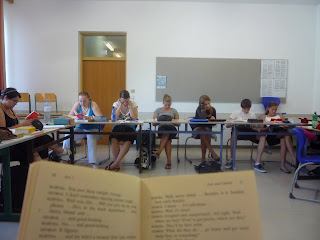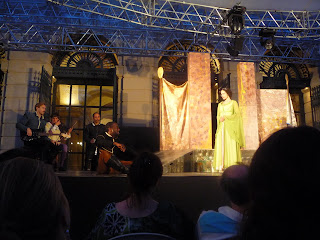A Streetcar Named Desire
[New Orleans' "Desire" line streetcar]
Setting:
- 1940's New Orleans, Louisiana, the French Quarter
[The French Quarter]
Relationships:
- Blanche & Mitch 1.
- Blanche & Stanley 2./3.
- Blanche & Allan ("denengerate") 2.
- Blanche & men - sexual exploitation
- Stella & Stanley - aggressive, passionate 3.
- Eunice & Steve - rather equal
Themes:
- Women are dependent on men
- Stella is dependent on Stanley - sexual relationship
- economic dependence
- women need men to achieve happiness, sustenance and self-image
- Blanche views marriage to Mitch as escape from destitution/from being a burden to Stella
- Social Classes
- disappearance of class distinction
- post-war America's transistion from an old to a new South
- Blanche represents the death of the Southern Elite (ideals: heritage, money, chivalry)
- Stanley represents the new american society; industrilization; rising, powerful immigrants
- Mental Illness
- Blanche's age denial
- Blanche's baths - becoming clean, innocent
- Illusion/Fantasy vs Reality
-Weakness/Power
- economic, physical, psychological
- abuse by men
- Death
- symbolic place names (Elysian Fields, Cemetary Streetcar line)
- Blanche's lost beauty
- Blanche's homosexual husband who commited suicide
- Violence
- fragility
- vulnerability
- Sisterly Affection
- Ethic Codes
- chivalric ≠ laws of nature
- decadence ≠ down-to-earth Blanche: "We need to mix our blood."
- Blanche waits for a "White Knight" to come rescue her
A History of New Orleans
- 1718 founded by the French Mississippi Co.
- mid-1700 to early-1800 owned by Spain, later regained by France
- 1803 Napoleon sold area to USA in the Louisiana Purchase
- 1830's and 40's largest slave market in the US
- 3rd largest and 1st wealthiest US city at the time
- current population: 336,644
- birthplace of Jazz music
- celebrates "Mardi Gras" every year on Fat Tuesday
The French in Louisiana
Creole Cajun
---------------------------- ------------------------------
french/spanish descent french-canadian descent (Acadia)
1804 Haitian Revolution, 1755 British expulsion of area
refugees to LA fled to LA
Parisian French, mixed with cajun french (derived from Acadian)
african french
Roman Catholic Roman Catholic
Common Foods of both groups:
- Seafood, shellfish (crawfish, catfish, oysters)
- Gumbo (type of soup)
- Jambalaya
- Red Beans and Rice
- typically spicy
[Jambalaya]
***********************************************************
Othello
Full title: The Tragedy of Othello, the Moor of Venice
by William Shakespeare
- A tragedy, published 1622
- Setting (time): Late sixteenth century, during the wars between Venice and Turkey
- Setting (place): Venice in Act I; the island of Cyprus thereafter
Characters:
- Othello:
- African (moor) general in Venetian army, becomes governor of Cyprus
- Eloquent, physically powerful, Christian
- Insecurities because of his age, his life as a soldier, and his race
- falls in love and secretly marries Desdemona
- Suspects Desdemona of infidelity and murders her; later commits suicide
- Desdemona:
- Venetian Noblewoman, daughter of Brabantio and wife of Othello
- Stereotypically pure and meek, but also determined and self-possessed
- Loyal, courageous and loves Othello till the end
- Iago:
- Othello’s ensign (aka: ancient or captain) and husband to Emilia
- Othello passes him over for a promotion, thus vows revenge
- delights in manipulation and destruction
- Emilia:
- Wife of Iago and lady-in-waiting to Desdemona
- suspects Iago’s wickedness but realizes it too late
- Deeply attached to Desdemona
- Worldly and cynical
- Cassio:
- Othello’s newly appointed loyal lieutenant; friend of Desdemona
- Popular, good-looking, well-spoken, lively and trusting
- Young and inexperienced soldier; Iago is jealous of his promotion
- Used by Iago to play on Othello’s insecurities about Desdemona’s fidelity
- becomes new governor of Cyprus after Othello dies
- Bianca:
- A courtesan/prostitute in love with Cassio
- Roderigo:
- A jealous nobleman in love with Desdemona
- Young, rich and foolish
- gives Iago money to have him help win Desdemona, later killed by Iago
Plot Overview:
- Venice; An argument between Roderigo and Iago. Roderigo’s been paying Iago to help him woo Desdemona, but has just learned that Desdemona married Iago’s general, Othello. Iago says he hates Othello, who gave the position of lieutenant to the inexperienced soldier Cassio instead of him. Brabantio upset about his daughter’s secret marriage to Othello but the Venetian senate realizes the couple’s true love and approves. Othello, with Desdemona, is sent to Cyprus to help with the Turkish invasion.
- Cyprus; Othello, Desdemona, Iago, Emilia, Roderigo and Cassio all arrive by ship. Roderigo complains of Othello and Desdemona’s marriage, Iago creates a rumor that Desdemona will likely take Cassio as a lover. Iago convinces Roderigo to fight Cassio. Iago gets Cassio drunk; Roderigo provokes a fight, Cassio punches Roderigo, who stabs Cassio.
- Iago defends his “friend” Cassio, but Othello is angry that Cassio fought and demotes him. Cassio tells Iago that his reputation is gone; Iago says he can return to Othello’s good graces by becoming friends with Desdemona. Iago tells the audience that he will stage Cassio and Desdemona as lovers to make Othello jealous.
- Cassio meets with Desdemona, who will help him reunite with Othello. Iago plants seeds of jealousy in Othello by saying he may have seen Cassio and Desdemona together. Othello becomes upset and moody. Desdemona drops the handkerchief that Othello had given her, Emilia picks it up and gives it to Iago, who has a copy made. Othello is outraged when Desdemona later can’t find her handkerchief.
- Othello becomes consumed with jealousy and thinks Desdemona and Cassio are lovers. Iago tells Othello to hide and overhear him asking Cassio about Desdemona. In reality, Iago asks Cassio about Bianca, a prostitute who is in love with him. Othello then sees Bianca with a copy of Desdemona’s handkerchief. She says Cassio gave it to her and that he had gotten it from another lover. Desdemona and her cousin Lodovico bring Othello papers from Venice saying that Othello should come back to Venice and Cassio is the new governor of Cyprus.
- That night, Othello, outraged, accuses Desdemona of being a whore and ignores her protests; he orders her to wait in bed while he takes care of state business. Meanwhile, Iago tells Roderigo that the plan is running smoothly and he will soon have Desdemona. Iago convinces Roderigo that he must kill Cassio in order to get Desdemona. Roderigo misses Cassio and is stabbed by him instead. Iago stabs Cassio, runs away. When Othello comes he assumes that Iago has tried to kill Cassio (his wife’s lover) as he had promised him. Iago arrives and kills Roderigo, who he said had stabbed Cassio.
- Later, Othello stands over the sleeping Desdemona, preparing to kill her. Desdemona awakes and pleas with Othello, saying that she was always faithful and loves him. He smothers her with a pillow. Emilia enters and says Roderigo is dead, but Cassio is not. Othello is once again enraged. Emilia asks why Othello murdered Desdemona; he explains her infidelity, brought to light by Iago.
- Emilia realizes what Iago did. Iago enters bedchamber and tries to kill Emilia. Othello says Iago told the truth (citing the handkerchief as evidence) but realizes his guilt after Emilia says she was the one to have stolen the handkerchief. Othello is crushed; tries to kill Iago, but Iago instead kills Emilia. Othello commits suicide.
Themes:
- LOVE:
- Love overcomes large obstacles but is tripped up by small ones
- Cyprus, home of the Greek goddess of love Aphrodite. Othello’s fortress on Cyprus was dedicated to war; love lost its supremacy – his military career is incompatible with his marriage
- Iago uses love as leverage for receiving money, deceiving and misleading others
- PREJUDICE:
- Against Africans in Venetian society
- Desdemona and Othello are aware of this prejudice, but Desdemona denies it
- Othello feels inferior and insecure (thinks that if Desdemona loves him, there must be something wrong with her)
- JEALOUSY:
- destroys Othello; his mind tightens around the idea that Desdemona betrayed him – no longer open to common sense
- APPEARANCE & REALITY:
- For Othello, seeing is believing, he needs visual proof of Desdemona’s deception – the Handkerchief.
- Othello sees Desdemona’s whiteness as purity and his blackness as evil; spurs his insecurity.


































